Organisational Behaviour Analysis: Waitrose Culture, Power, Politics
VerifiedAdded on 2021/02/20
|23
|6862
|93
Report
AI Summary
This report provides an in-depth analysis of Waitrose's organizational behaviour, examining the impact of culture, power, and politics on its operations. It explores various organizational culture models, including Handy's and Hofstede's, and their application within Waitrose. The report also delves into different forms of power, such as coercive, reward, legitimate, referent, expert, and informational power, and how they influence employee behaviour. Furthermore, it discusses motivational theories like Maslow's Hierarchy of Needs and their practical implementation within Waitrose to enhance employee performance and satisfaction. The study also covers the dynamics of effective and ineffective teams and the role of politics in the workplace. Overall, this report offers valuable insights into the organizational structure, leadership strategies, and employee motivation within Waitrose, providing a comprehensive understanding of its operational environment.
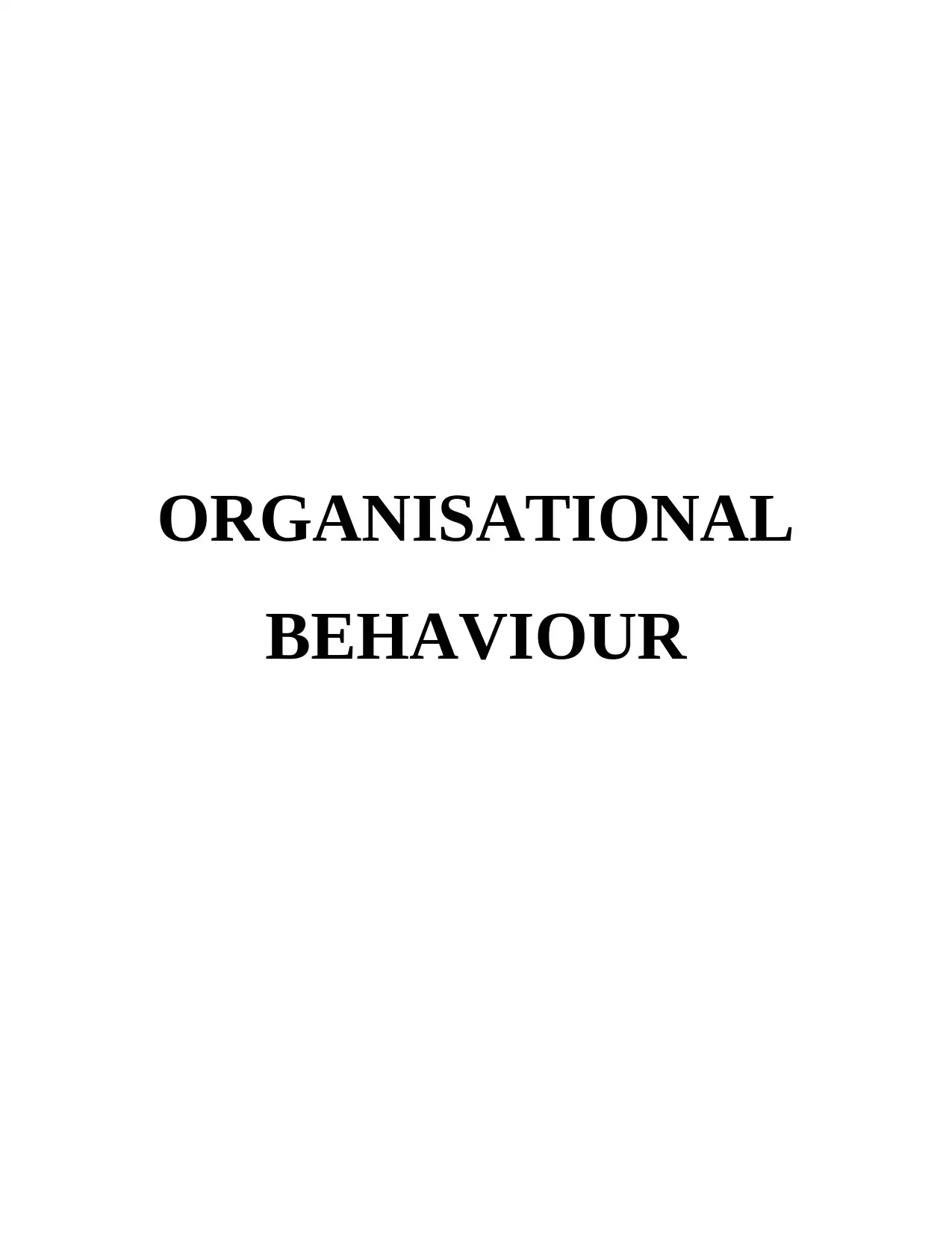
ORGANISATIONAL
BEHAVIOUR
BEHAVIOUR
Paraphrase This Document
Need a fresh take? Get an instant paraphrase of this document with our AI Paraphraser
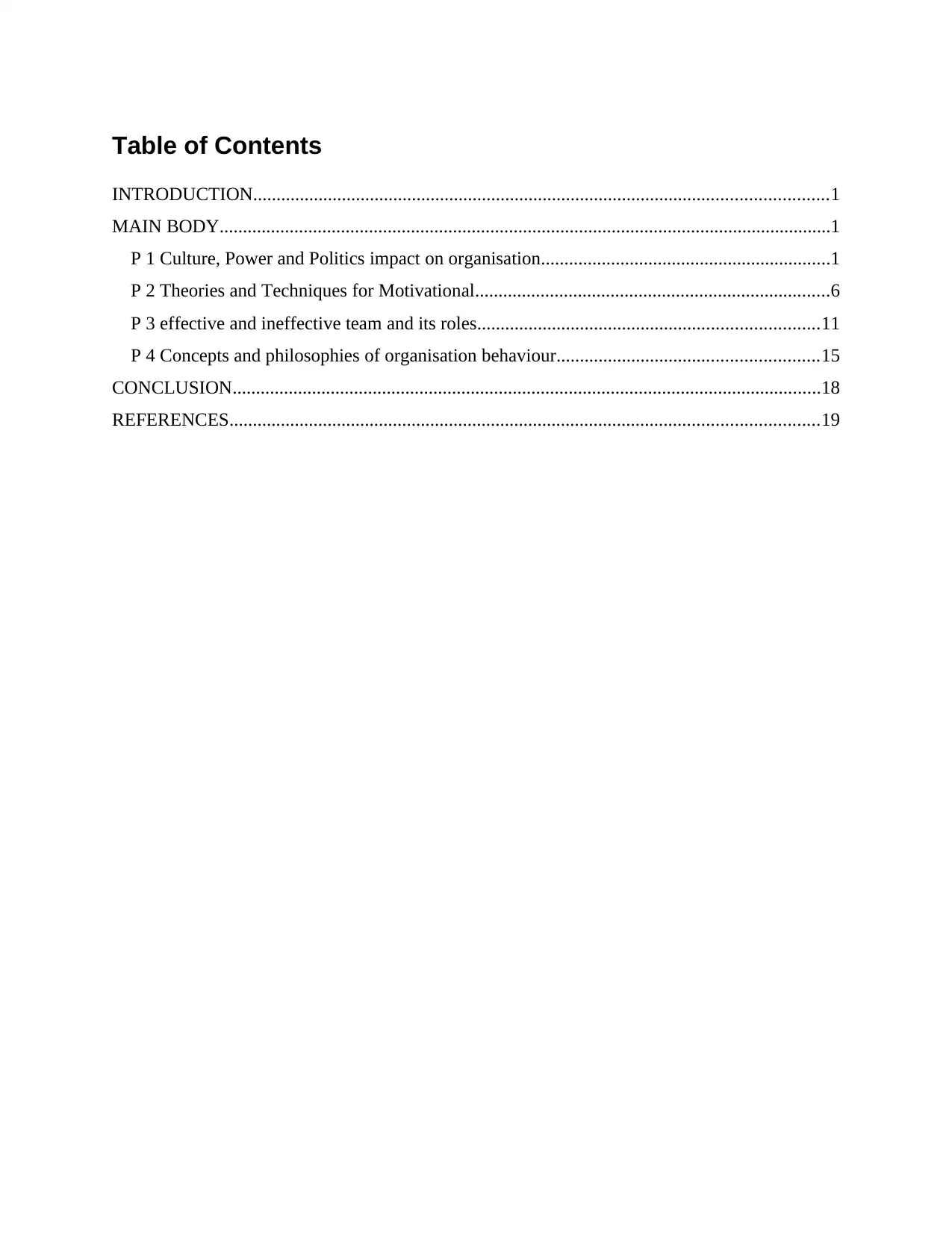
Table of Contents
INTRODUCTION...........................................................................................................................1
MAIN BODY...................................................................................................................................1
P 1 Culture, Power and Politics impact on organisation..............................................................1
P 2 Theories and Techniques for Motivational............................................................................6
P 3 effective and ineffective team and its roles.........................................................................11
P 4 Concepts and philosophies of organisation behaviour........................................................15
CONCLUSION..............................................................................................................................18
REFERENCES..............................................................................................................................19
INTRODUCTION...........................................................................................................................1
MAIN BODY...................................................................................................................................1
P 1 Culture, Power and Politics impact on organisation..............................................................1
P 2 Theories and Techniques for Motivational............................................................................6
P 3 effective and ineffective team and its roles.........................................................................11
P 4 Concepts and philosophies of organisation behaviour........................................................15
CONCLUSION..............................................................................................................................18
REFERENCES..............................................................................................................................19
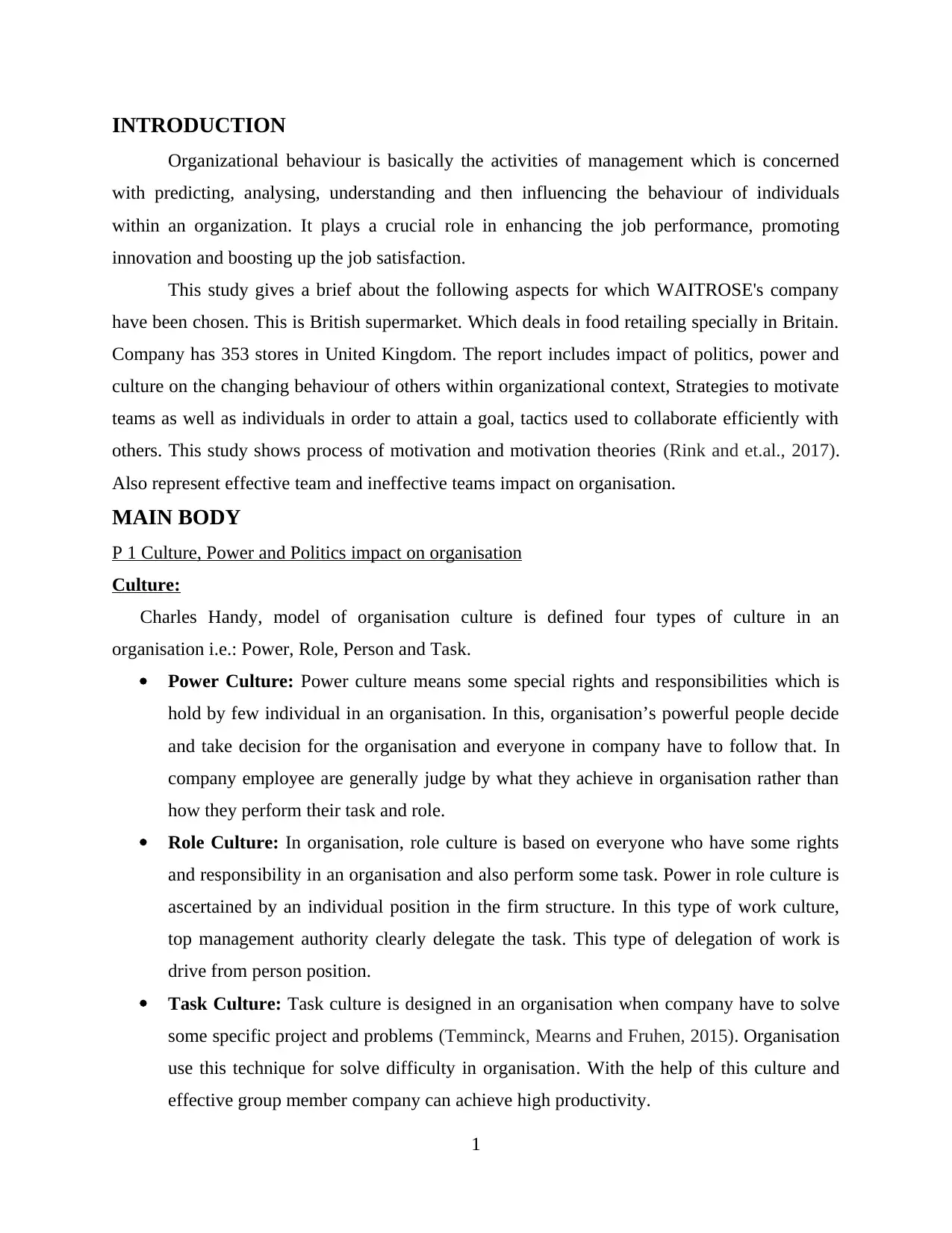
INTRODUCTION
Organizational behaviour is basically the activities of management which is concerned
with predicting, analysing, understanding and then influencing the behaviour of individuals
within an organization. It plays a crucial role in enhancing the job performance, promoting
innovation and boosting up the job satisfaction.
This study gives a brief about the following aspects for which WAITROSE's company
have been chosen. This is British supermarket. Which deals in food retailing specially in Britain.
Company has 353 stores in United Kingdom. The report includes impact of politics, power and
culture on the changing behaviour of others within organizational context, Strategies to motivate
teams as well as individuals in order to attain a goal, tactics used to collaborate efficiently with
others. This study shows process of motivation and motivation theories (Rink and et.al., 2017).
Also represent effective team and ineffective teams impact on organisation.
MAIN BODY
P 1 Culture, Power and Politics impact on organisation
Culture:
Charles Handy, model of organisation culture is defined four types of culture in an
organisation i.e.: Power, Role, Person and Task.
Power Culture: Power culture means some special rights and responsibilities which is
hold by few individual in an organisation. In this, organisation’s powerful people decide
and take decision for the organisation and everyone in company have to follow that. In
company employee are generally judge by what they achieve in organisation rather than
how they perform their task and role.
Role Culture: In organisation, role culture is based on everyone who have some rights
and responsibility in an organisation and also perform some task. Power in role culture is
ascertained by an individual position in the firm structure. In this type of work culture,
top management authority clearly delegate the task. This type of delegation of work is
drive from person position.
Task Culture: Task culture is designed in an organisation when company have to solve
some specific project and problems (Temminck, Mearns and Fruhen, 2015). Organisation
use this technique for solve difficulty in organisation. With the help of this culture and
effective group member company can achieve high productivity.
1
Organizational behaviour is basically the activities of management which is concerned
with predicting, analysing, understanding and then influencing the behaviour of individuals
within an organization. It plays a crucial role in enhancing the job performance, promoting
innovation and boosting up the job satisfaction.
This study gives a brief about the following aspects for which WAITROSE's company
have been chosen. This is British supermarket. Which deals in food retailing specially in Britain.
Company has 353 stores in United Kingdom. The report includes impact of politics, power and
culture on the changing behaviour of others within organizational context, Strategies to motivate
teams as well as individuals in order to attain a goal, tactics used to collaborate efficiently with
others. This study shows process of motivation and motivation theories (Rink and et.al., 2017).
Also represent effective team and ineffective teams impact on organisation.
MAIN BODY
P 1 Culture, Power and Politics impact on organisation
Culture:
Charles Handy, model of organisation culture is defined four types of culture in an
organisation i.e.: Power, Role, Person and Task.
Power Culture: Power culture means some special rights and responsibilities which is
hold by few individual in an organisation. In this, organisation’s powerful people decide
and take decision for the organisation and everyone in company have to follow that. In
company employee are generally judge by what they achieve in organisation rather than
how they perform their task and role.
Role Culture: In organisation, role culture is based on everyone who have some rights
and responsibility in an organisation and also perform some task. Power in role culture is
ascertained by an individual position in the firm structure. In this type of work culture,
top management authority clearly delegate the task. This type of delegation of work is
drive from person position.
Task Culture: Task culture is designed in an organisation when company have to solve
some specific project and problems (Temminck, Mearns and Fruhen, 2015). Organisation
use this technique for solve difficulty in organisation. With the help of this culture and
effective group member company can achieve high productivity.
1
⊘ This is a preview!⊘
Do you want full access?
Subscribe today to unlock all pages.

Trusted by 1+ million students worldwide
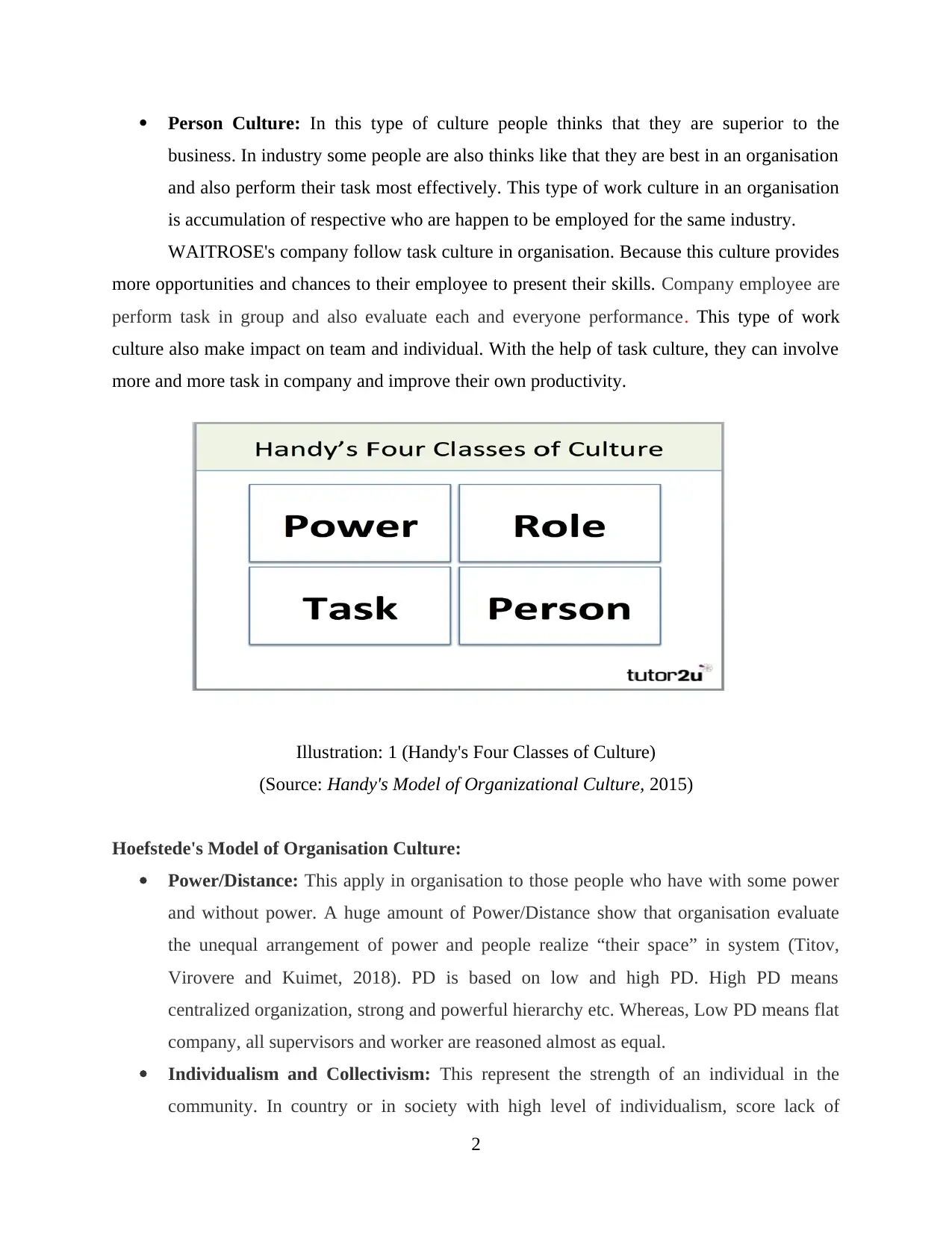
Person Culture: In this type of culture people thinks that they are superior to the
business. In industry some people are also thinks like that they are best in an organisation
and also perform their task most effectively. This type of work culture in an organisation
is accumulation of respective who are happen to be employed for the same industry.
WAITROSE's company follow task culture in organisation. Because this culture provides
more opportunities and chances to their employee to present their skills. Company employee are
perform task in group and also evaluate each and everyone performance. This type of work
culture also make impact on team and individual. With the help of task culture, they can involve
more and more task in company and improve their own productivity.
Illustration: 1 (Handy's Four Classes of Culture)
(Source: Handy's Model of Organizational Culture, 2015)
Hoefstede's Model of Organisation Culture:
Power/Distance: This apply in organisation to those people who have with some power
and without power. A huge amount of Power/Distance show that organisation evaluate
the unequal arrangement of power and people realize “their space” in system (Titov,
Virovere and Kuimet, 2018). PD is based on low and high PD. High PD means
centralized organization, strong and powerful hierarchy etc. Whereas, Low PD means flat
company, all supervisors and worker are reasoned almost as equal.
Individualism and Collectivism: This represent the strength of an individual in the
community. In country or in society with high level of individualism, score lack of
2
business. In industry some people are also thinks like that they are best in an organisation
and also perform their task most effectively. This type of work culture in an organisation
is accumulation of respective who are happen to be employed for the same industry.
WAITROSE's company follow task culture in organisation. Because this culture provides
more opportunities and chances to their employee to present their skills. Company employee are
perform task in group and also evaluate each and everyone performance. This type of work
culture also make impact on team and individual. With the help of task culture, they can involve
more and more task in company and improve their own productivity.
Illustration: 1 (Handy's Four Classes of Culture)
(Source: Handy's Model of Organizational Culture, 2015)
Hoefstede's Model of Organisation Culture:
Power/Distance: This apply in organisation to those people who have with some power
and without power. A huge amount of Power/Distance show that organisation evaluate
the unequal arrangement of power and people realize “their space” in system (Titov,
Virovere and Kuimet, 2018). PD is based on low and high PD. High PD means
centralized organization, strong and powerful hierarchy etc. Whereas, Low PD means flat
company, all supervisors and worker are reasoned almost as equal.
Individualism and Collectivism: This represent the strength of an individual in the
community. In country or in society with high level of individualism, score lack of
2
Paraphrase This Document
Need a fresh take? Get an instant paraphrase of this document with our AI Paraphraser
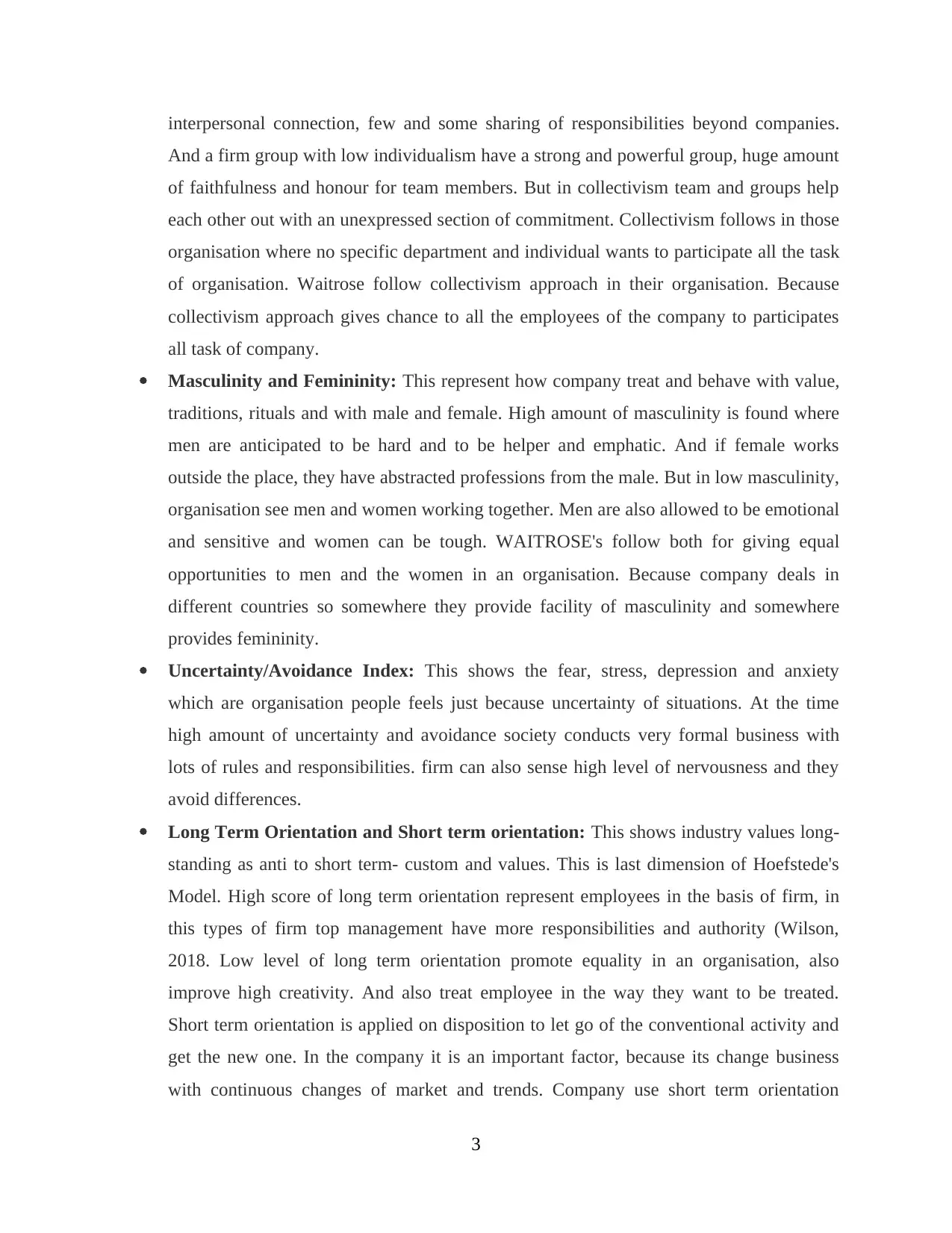
interpersonal connection, few and some sharing of responsibilities beyond companies.
And a firm group with low individualism have a strong and powerful group, huge amount
of faithfulness and honour for team members. But in collectivism team and groups help
each other out with an unexpressed section of commitment. Collectivism follows in those
organisation where no specific department and individual wants to participate all the task
of organisation. Waitrose follow collectivism approach in their organisation. Because
collectivism approach gives chance to all the employees of the company to participates
all task of company.
Masculinity and Femininity: This represent how company treat and behave with value,
traditions, rituals and with male and female. High amount of masculinity is found where
men are anticipated to be hard and to be helper and emphatic. And if female works
outside the place, they have abstracted professions from the male. But in low masculinity,
organisation see men and women working together. Men are also allowed to be emotional
and sensitive and women can be tough. WAITROSE's follow both for giving equal
opportunities to men and the women in an organisation. Because company deals in
different countries so somewhere they provide facility of masculinity and somewhere
provides femininity.
Uncertainty/Avoidance Index: This shows the fear, stress, depression and anxiety
which are organisation people feels just because uncertainty of situations. At the time
high amount of uncertainty and avoidance society conducts very formal business with
lots of rules and responsibilities. firm can also sense high level of nervousness and they
avoid differences.
Long Term Orientation and Short term orientation: This shows industry values long-
standing as anti to short term- custom and values. This is last dimension of Hoefstede's
Model. High score of long term orientation represent employees in the basis of firm, in
this types of firm top management have more responsibilities and authority (Wilson,
2018. Low level of long term orientation promote equality in an organisation, also
improve high creativity. And also treat employee in the way they want to be treated.
Short term orientation is applied on disposition to let go of the conventional activity and
get the new one. In the company it is an important factor, because its change business
with continuous changes of market and trends. Company use short term orientation
3
And a firm group with low individualism have a strong and powerful group, huge amount
of faithfulness and honour for team members. But in collectivism team and groups help
each other out with an unexpressed section of commitment. Collectivism follows in those
organisation where no specific department and individual wants to participate all the task
of organisation. Waitrose follow collectivism approach in their organisation. Because
collectivism approach gives chance to all the employees of the company to participates
all task of company.
Masculinity and Femininity: This represent how company treat and behave with value,
traditions, rituals and with male and female. High amount of masculinity is found where
men are anticipated to be hard and to be helper and emphatic. And if female works
outside the place, they have abstracted professions from the male. But in low masculinity,
organisation see men and women working together. Men are also allowed to be emotional
and sensitive and women can be tough. WAITROSE's follow both for giving equal
opportunities to men and the women in an organisation. Because company deals in
different countries so somewhere they provide facility of masculinity and somewhere
provides femininity.
Uncertainty/Avoidance Index: This shows the fear, stress, depression and anxiety
which are organisation people feels just because uncertainty of situations. At the time
high amount of uncertainty and avoidance society conducts very formal business with
lots of rules and responsibilities. firm can also sense high level of nervousness and they
avoid differences.
Long Term Orientation and Short term orientation: This shows industry values long-
standing as anti to short term- custom and values. This is last dimension of Hoefstede's
Model. High score of long term orientation represent employees in the basis of firm, in
this types of firm top management have more responsibilities and authority (Wilson,
2018. Low level of long term orientation promote equality in an organisation, also
improve high creativity. And also treat employee in the way they want to be treated.
Short term orientation is applied on disposition to let go of the conventional activity and
get the new one. In the company it is an important factor, because its change business
with continuous changes of market and trends. Company use short term orientation
3
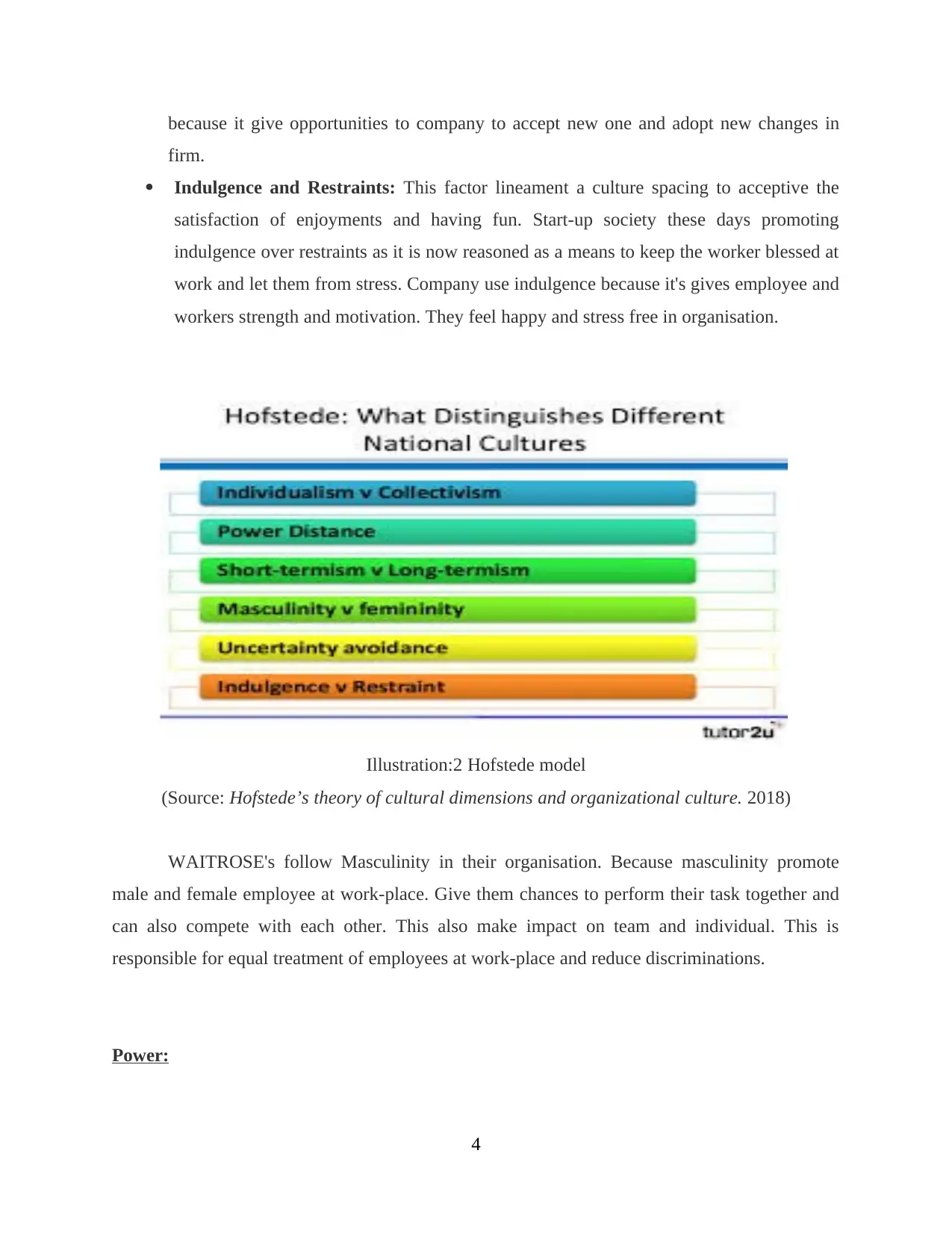
because it give opportunities to company to accept new one and adopt new changes in
firm.
Indulgence and Restraints: This factor lineament a culture spacing to acceptive the
satisfaction of enjoyments and having fun. Start-up society these days promoting
indulgence over restraints as it is now reasoned as a means to keep the worker blessed at
work and let them from stress. Company use indulgence because it's gives employee and
workers strength and motivation. They feel happy and stress free in organisation.
Illustration:2 Hofstede model
(Source: Hofstede’s theory of cultural dimensions and organizational culture. 2018)
WAITROSE's follow Masculinity in their organisation. Because masculinity promote
male and female employee at work-place. Give them chances to perform their task together and
can also compete with each other. This also make impact on team and individual. This is
responsible for equal treatment of employees at work-place and reduce discriminations.
Power:
4
firm.
Indulgence and Restraints: This factor lineament a culture spacing to acceptive the
satisfaction of enjoyments and having fun. Start-up society these days promoting
indulgence over restraints as it is now reasoned as a means to keep the worker blessed at
work and let them from stress. Company use indulgence because it's gives employee and
workers strength and motivation. They feel happy and stress free in organisation.
Illustration:2 Hofstede model
(Source: Hofstede’s theory of cultural dimensions and organizational culture. 2018)
WAITROSE's follow Masculinity in their organisation. Because masculinity promote
male and female employee at work-place. Give them chances to perform their task together and
can also compete with each other. This also make impact on team and individual. This is
responsible for equal treatment of employees at work-place and reduce discriminations.
Power:
4
⊘ This is a preview!⊘
Do you want full access?
Subscribe today to unlock all pages.

Trusted by 1+ million students worldwide
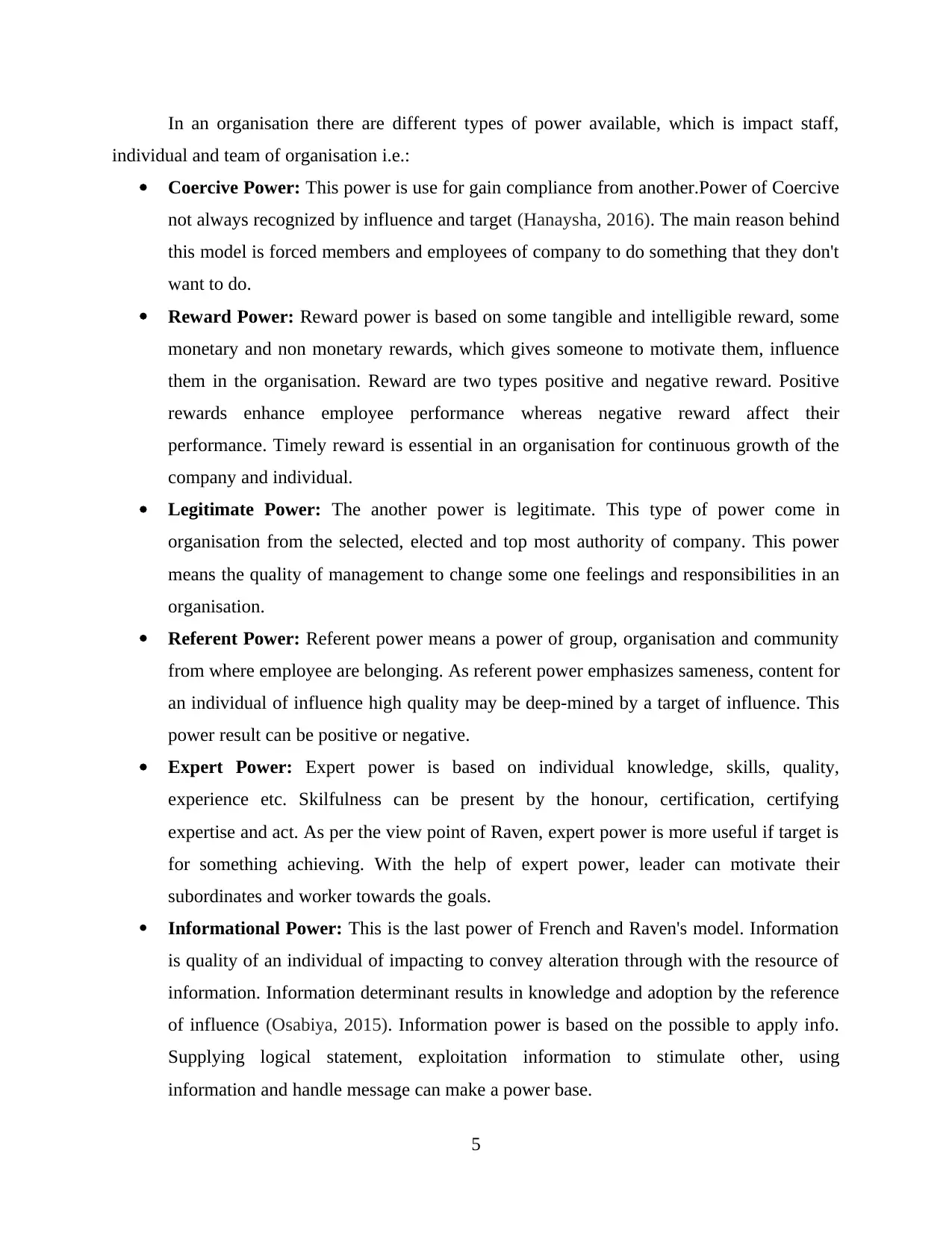
In an organisation there are different types of power available, which is impact staff,
individual and team of organisation i.e.:
Coercive Power: This power is use for gain compliance from another.Power of Coercive
not always recognized by influence and target (Hanaysha, 2016). The main reason behind
this model is forced members and employees of company to do something that they don't
want to do.
Reward Power: Reward power is based on some tangible and intelligible reward, some
monetary and non monetary rewards, which gives someone to motivate them, influence
them in the organisation. Reward are two types positive and negative reward. Positive
rewards enhance employee performance whereas negative reward affect their
performance. Timely reward is essential in an organisation for continuous growth of the
company and individual.
Legitimate Power: The another power is legitimate. This type of power come in
organisation from the selected, elected and top most authority of company. This power
means the quality of management to change some one feelings and responsibilities in an
organisation.
Referent Power: Referent power means a power of group, organisation and community
from where employee are belonging. As referent power emphasizes sameness, content for
an individual of influence high quality may be deep-mined by a target of influence. This
power result can be positive or negative.
Expert Power: Expert power is based on individual knowledge, skills, quality,
experience etc. Skilfulness can be present by the honour, certification, certifying
expertise and act. As per the view point of Raven, expert power is more useful if target is
for something achieving. With the help of expert power, leader can motivate their
subordinates and worker towards the goals.
Informational Power: This is the last power of French and Raven's model. Information
is quality of an individual of impacting to convey alteration through with the resource of
information. Information determinant results in knowledge and adoption by the reference
of influence (Osabiya, 2015). Information power is based on the possible to apply info.
Supplying logical statement, exploitation information to stimulate other, using
information and handle message can make a power base.
5
individual and team of organisation i.e.:
Coercive Power: This power is use for gain compliance from another.Power of Coercive
not always recognized by influence and target (Hanaysha, 2016). The main reason behind
this model is forced members and employees of company to do something that they don't
want to do.
Reward Power: Reward power is based on some tangible and intelligible reward, some
monetary and non monetary rewards, which gives someone to motivate them, influence
them in the organisation. Reward are two types positive and negative reward. Positive
rewards enhance employee performance whereas negative reward affect their
performance. Timely reward is essential in an organisation for continuous growth of the
company and individual.
Legitimate Power: The another power is legitimate. This type of power come in
organisation from the selected, elected and top most authority of company. This power
means the quality of management to change some one feelings and responsibilities in an
organisation.
Referent Power: Referent power means a power of group, organisation and community
from where employee are belonging. As referent power emphasizes sameness, content for
an individual of influence high quality may be deep-mined by a target of influence. This
power result can be positive or negative.
Expert Power: Expert power is based on individual knowledge, skills, quality,
experience etc. Skilfulness can be present by the honour, certification, certifying
expertise and act. As per the view point of Raven, expert power is more useful if target is
for something achieving. With the help of expert power, leader can motivate their
subordinates and worker towards the goals.
Informational Power: This is the last power of French and Raven's model. Information
is quality of an individual of impacting to convey alteration through with the resource of
information. Information determinant results in knowledge and adoption by the reference
of influence (Osabiya, 2015). Information power is based on the possible to apply info.
Supplying logical statement, exploitation information to stimulate other, using
information and handle message can make a power base.
5
Paraphrase This Document
Need a fresh take? Get an instant paraphrase of this document with our AI Paraphraser
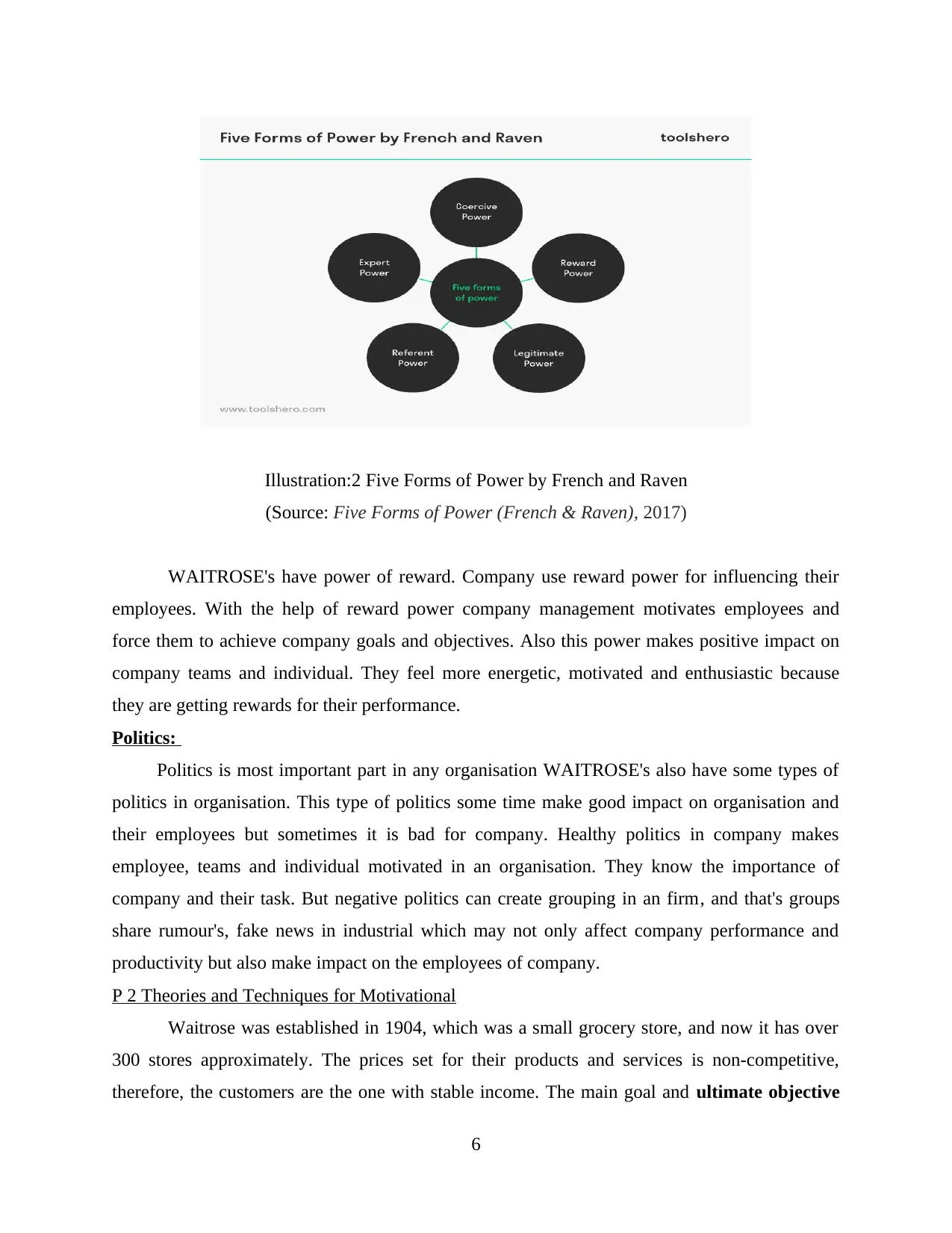
Illustration:2 Five Forms of Power by French and Raven
(Source: Five Forms of Power (French & Raven), 2017)
WAITROSE's have power of reward. Company use reward power for influencing their
employees. With the help of reward power company management motivates employees and
force them to achieve company goals and objectives. Also this power makes positive impact on
company teams and individual. They feel more energetic, motivated and enthusiastic because
they are getting rewards for their performance.
Politics:
Politics is most important part in any organisation WAITROSE's also have some types of
politics in organisation. This type of politics some time make good impact on organisation and
their employees but sometimes it is bad for company. Healthy politics in company makes
employee, teams and individual motivated in an organisation. They know the importance of
company and their task. But negative politics can create grouping in an firm, and that's groups
share rumour's, fake news in industrial which may not only affect company performance and
productivity but also make impact on the employees of company.
P 2 Theories and Techniques for Motivational
Waitrose was established in 1904, which was a small grocery store, and now it has over
300 stores approximately. The prices set for their products and services is non-competitive,
therefore, the customers are the one with stable income. The main goal and ultimate objective
6
(Source: Five Forms of Power (French & Raven), 2017)
WAITROSE's have power of reward. Company use reward power for influencing their
employees. With the help of reward power company management motivates employees and
force them to achieve company goals and objectives. Also this power makes positive impact on
company teams and individual. They feel more energetic, motivated and enthusiastic because
they are getting rewards for their performance.
Politics:
Politics is most important part in any organisation WAITROSE's also have some types of
politics in organisation. This type of politics some time make good impact on organisation and
their employees but sometimes it is bad for company. Healthy politics in company makes
employee, teams and individual motivated in an organisation. They know the importance of
company and their task. But negative politics can create grouping in an firm, and that's groups
share rumour's, fake news in industrial which may not only affect company performance and
productivity but also make impact on the employees of company.
P 2 Theories and Techniques for Motivational
Waitrose was established in 1904, which was a small grocery store, and now it has over
300 stores approximately. The prices set for their products and services is non-competitive,
therefore, the customers are the one with stable income. The main goal and ultimate objective
6
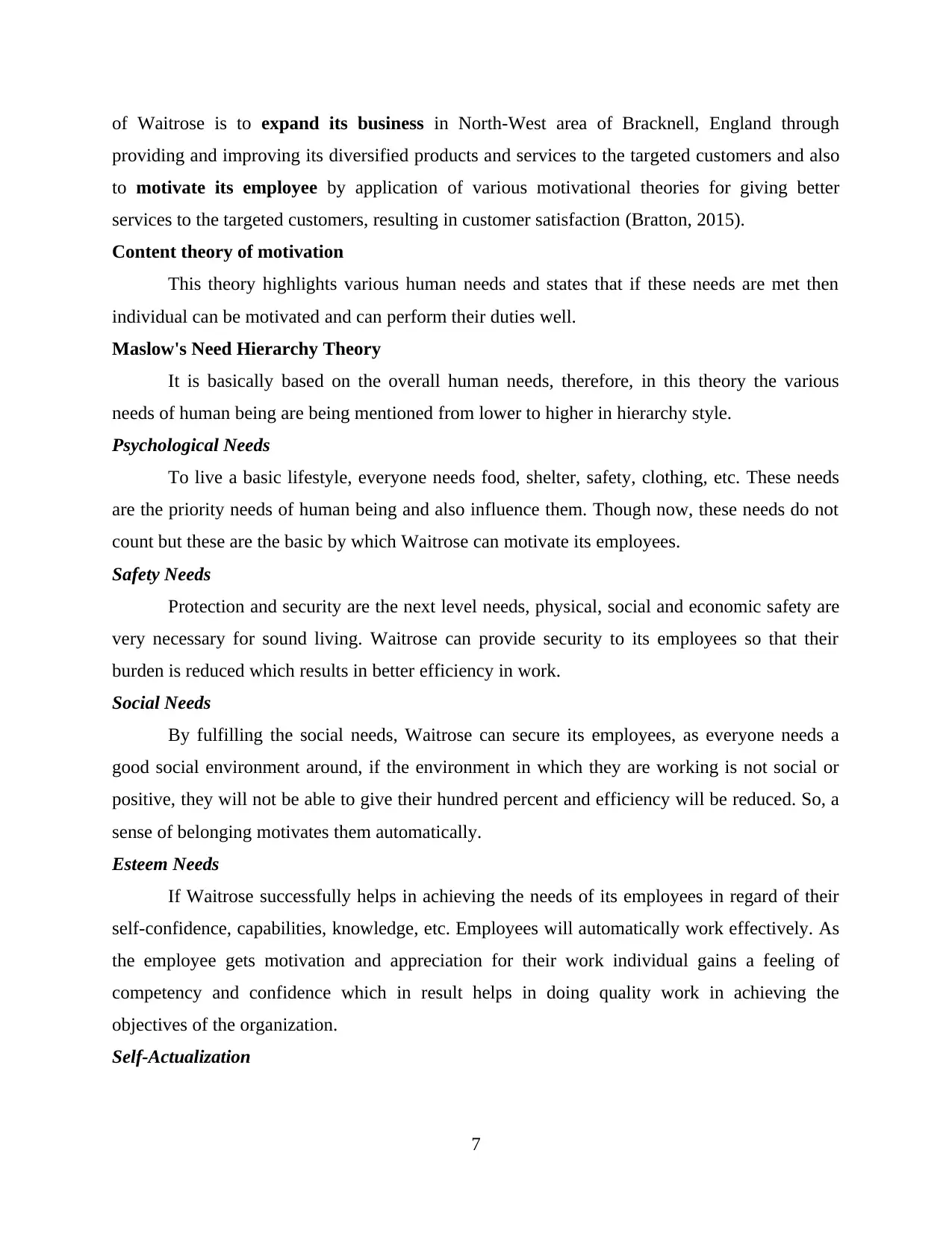
of Waitrose is to expand its business in North-West area of Bracknell, England through
providing and improving its diversified products and services to the targeted customers and also
to motivate its employee by application of various motivational theories for giving better
services to the targeted customers, resulting in customer satisfaction (Bratton, 2015).
Content theory of motivation
This theory highlights various human needs and states that if these needs are met then
individual can be motivated and can perform their duties well.
Maslow's Need Hierarchy Theory
It is basically based on the overall human needs, therefore, in this theory the various
needs of human being are being mentioned from lower to higher in hierarchy style.
Psychological Needs
To live a basic lifestyle, everyone needs food, shelter, safety, clothing, etc. These needs
are the priority needs of human being and also influence them. Though now, these needs do not
count but these are the basic by which Waitrose can motivate its employees.
Safety Needs
Protection and security are the next level needs, physical, social and economic safety are
very necessary for sound living. Waitrose can provide security to its employees so that their
burden is reduced which results in better efficiency in work.
Social Needs
By fulfilling the social needs, Waitrose can secure its employees, as everyone needs a
good social environment around, if the environment in which they are working is not social or
positive, they will not be able to give their hundred percent and efficiency will be reduced. So, a
sense of belonging motivates them automatically.
Esteem Needs
If Waitrose successfully helps in achieving the needs of its employees in regard of their
self-confidence, capabilities, knowledge, etc. Employees will automatically work effectively. As
the employee gets motivation and appreciation for their work individual gains a feeling of
competency and confidence which in result helps in doing quality work in achieving the
objectives of the organization.
Self-Actualization
7
providing and improving its diversified products and services to the targeted customers and also
to motivate its employee by application of various motivational theories for giving better
services to the targeted customers, resulting in customer satisfaction (Bratton, 2015).
Content theory of motivation
This theory highlights various human needs and states that if these needs are met then
individual can be motivated and can perform their duties well.
Maslow's Need Hierarchy Theory
It is basically based on the overall human needs, therefore, in this theory the various
needs of human being are being mentioned from lower to higher in hierarchy style.
Psychological Needs
To live a basic lifestyle, everyone needs food, shelter, safety, clothing, etc. These needs
are the priority needs of human being and also influence them. Though now, these needs do not
count but these are the basic by which Waitrose can motivate its employees.
Safety Needs
Protection and security are the next level needs, physical, social and economic safety are
very necessary for sound living. Waitrose can provide security to its employees so that their
burden is reduced which results in better efficiency in work.
Social Needs
By fulfilling the social needs, Waitrose can secure its employees, as everyone needs a
good social environment around, if the environment in which they are working is not social or
positive, they will not be able to give their hundred percent and efficiency will be reduced. So, a
sense of belonging motivates them automatically.
Esteem Needs
If Waitrose successfully helps in achieving the needs of its employees in regard of their
self-confidence, capabilities, knowledge, etc. Employees will automatically work effectively. As
the employee gets motivation and appreciation for their work individual gains a feeling of
competency and confidence which in result helps in doing quality work in achieving the
objectives of the organization.
Self-Actualization
7
⊘ This is a preview!⊘
Do you want full access?
Subscribe today to unlock all pages.

Trusted by 1+ million students worldwide
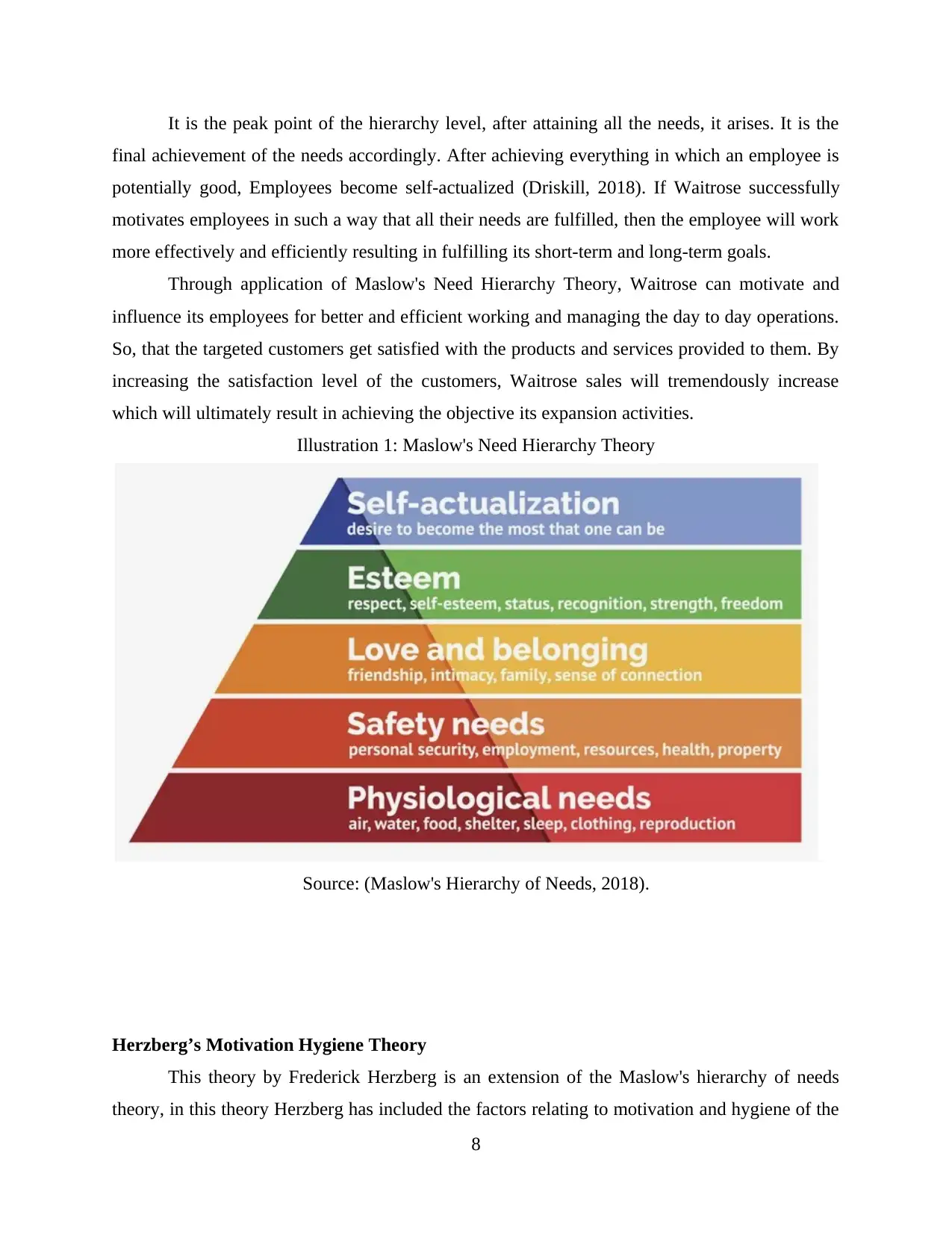
It is the peak point of the hierarchy level, after attaining all the needs, it arises. It is the
final achievement of the needs accordingly. After achieving everything in which an employee is
potentially good, Employees become self-actualized (Driskill, 2018). If Waitrose successfully
motivates employees in such a way that all their needs are fulfilled, then the employee will work
more effectively and efficiently resulting in fulfilling its short-term and long-term goals.
Through application of Maslow's Need Hierarchy Theory, Waitrose can motivate and
influence its employees for better and efficient working and managing the day to day operations.
So, that the targeted customers get satisfied with the products and services provided to them. By
increasing the satisfaction level of the customers, Waitrose sales will tremendously increase
which will ultimately result in achieving the objective its expansion activities.
Illustration 1: Maslow's Need Hierarchy Theory
Source: (Maslow's Hierarchy of Needs, 2018).
Herzberg’s Motivation Hygiene Theory
This theory by Frederick Herzberg is an extension of the Maslow's hierarchy of needs
theory, in this theory Herzberg has included the factors relating to motivation and hygiene of the
8
final achievement of the needs accordingly. After achieving everything in which an employee is
potentially good, Employees become self-actualized (Driskill, 2018). If Waitrose successfully
motivates employees in such a way that all their needs are fulfilled, then the employee will work
more effectively and efficiently resulting in fulfilling its short-term and long-term goals.
Through application of Maslow's Need Hierarchy Theory, Waitrose can motivate and
influence its employees for better and efficient working and managing the day to day operations.
So, that the targeted customers get satisfied with the products and services provided to them. By
increasing the satisfaction level of the customers, Waitrose sales will tremendously increase
which will ultimately result in achieving the objective its expansion activities.
Illustration 1: Maslow's Need Hierarchy Theory
Source: (Maslow's Hierarchy of Needs, 2018).
Herzberg’s Motivation Hygiene Theory
This theory by Frederick Herzberg is an extension of the Maslow's hierarchy of needs
theory, in this theory Herzberg has included the factors relating to motivation and hygiene of the
8
Paraphrase This Document
Need a fresh take? Get an instant paraphrase of this document with our AI Paraphraser
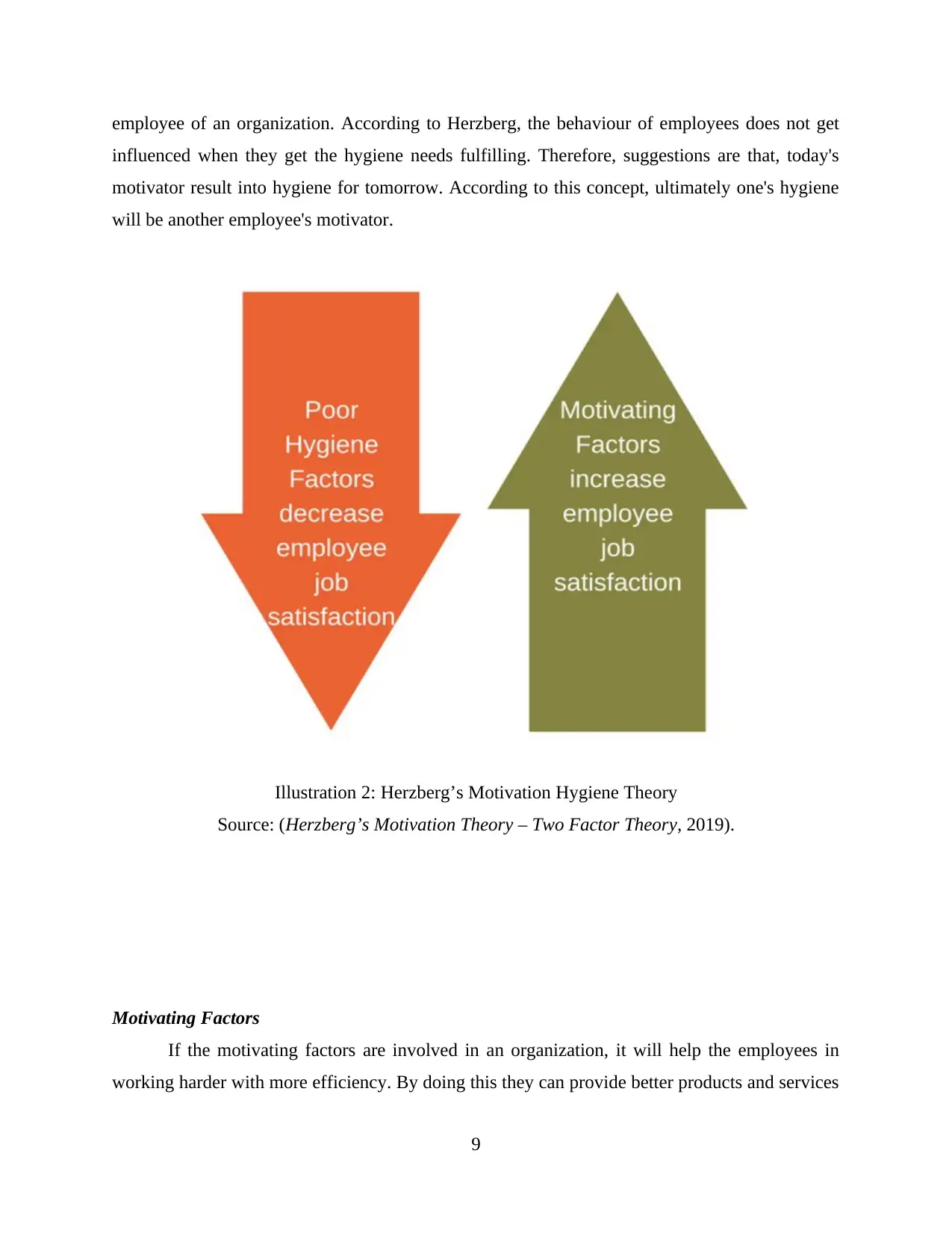
employee of an organization. According to Herzberg, the behaviour of employees does not get
influenced when they get the hygiene needs fulfilling. Therefore, suggestions are that, today's
motivator result into hygiene for tomorrow. According to this concept, ultimately one's hygiene
will be another employee's motivator.
Illustration 2: Herzberg’s Motivation Hygiene Theory
Source: (Herzberg’s Motivation Theory – Two Factor Theory, 2019).
Motivating Factors
If the motivating factors are involved in an organization, it will help the employees in
working harder with more efficiency. By doing this they can provide better products and services
9
influenced when they get the hygiene needs fulfilling. Therefore, suggestions are that, today's
motivator result into hygiene for tomorrow. According to this concept, ultimately one's hygiene
will be another employee's motivator.
Illustration 2: Herzberg’s Motivation Hygiene Theory
Source: (Herzberg’s Motivation Theory – Two Factor Theory, 2019).
Motivating Factors
If the motivating factors are involved in an organization, it will help the employees in
working harder with more efficiency. By doing this they can provide better products and services
9
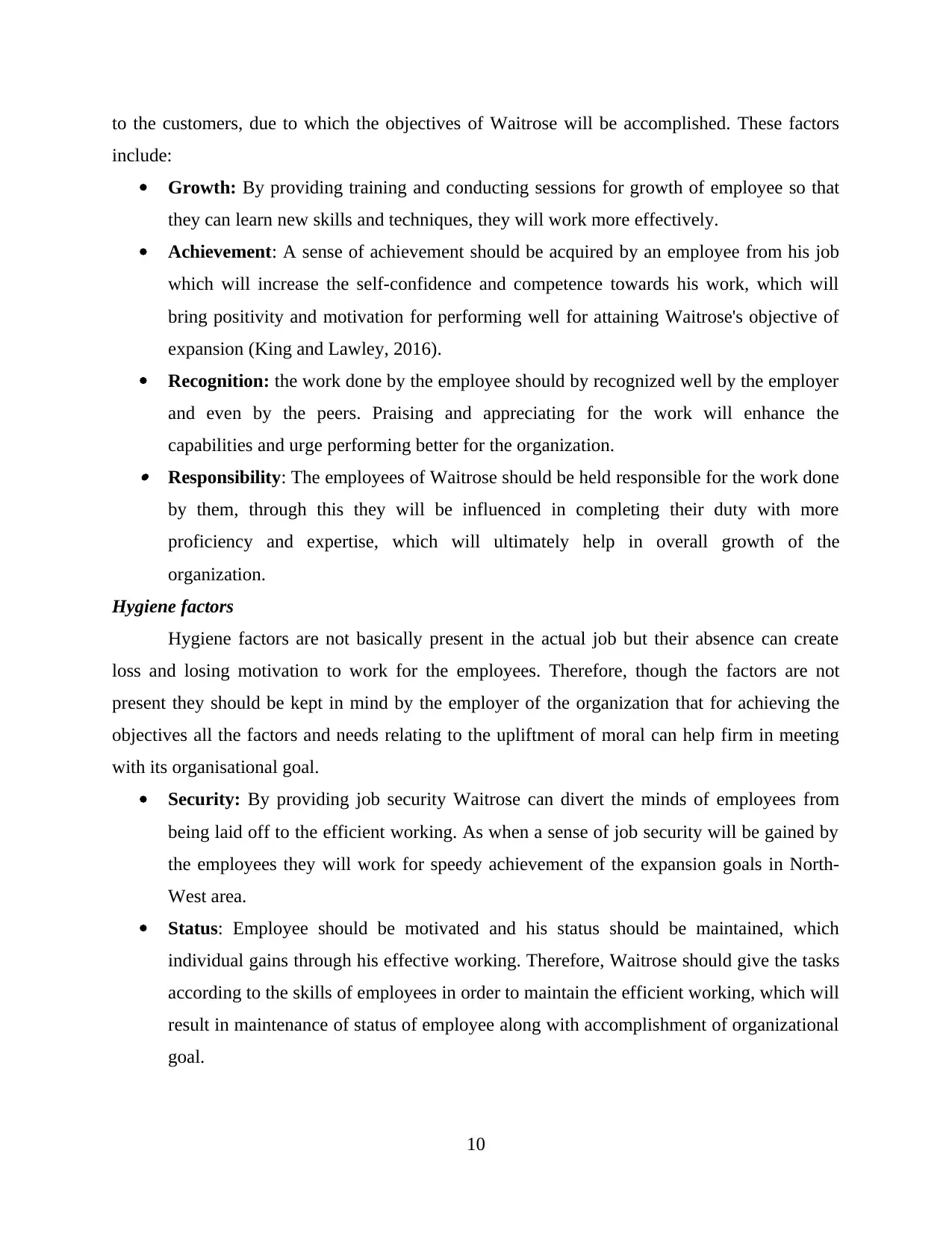
to the customers, due to which the objectives of Waitrose will be accomplished. These factors
include:
Growth: By providing training and conducting sessions for growth of employee so that
they can learn new skills and techniques, they will work more effectively.
Achievement: A sense of achievement should be acquired by an employee from his job
which will increase the self-confidence and competence towards his work, which will
bring positivity and motivation for performing well for attaining Waitrose's objective of
expansion (King and Lawley, 2016).
Recognition: the work done by the employee should by recognized well by the employer
and even by the peers. Praising and appreciating for the work will enhance the
capabilities and urge performing better for the organization. Responsibility: The employees of Waitrose should be held responsible for the work done
by them, through this they will be influenced in completing their duty with more
proficiency and expertise, which will ultimately help in overall growth of the
organization.
Hygiene factors
Hygiene factors are not basically present in the actual job but their absence can create
loss and losing motivation to work for the employees. Therefore, though the factors are not
present they should be kept in mind by the employer of the organization that for achieving the
objectives all the factors and needs relating to the upliftment of moral can help firm in meeting
with its organisational goal.
Security: By providing job security Waitrose can divert the minds of employees from
being laid off to the efficient working. As when a sense of job security will be gained by
the employees they will work for speedy achievement of the expansion goals in North-
West area.
Status: Employee should be motivated and his status should be maintained, which
individual gains through his effective working. Therefore, Waitrose should give the tasks
according to the skills of employees in order to maintain the efficient working, which will
result in maintenance of status of employee along with accomplishment of organizational
goal.
10
include:
Growth: By providing training and conducting sessions for growth of employee so that
they can learn new skills and techniques, they will work more effectively.
Achievement: A sense of achievement should be acquired by an employee from his job
which will increase the self-confidence and competence towards his work, which will
bring positivity and motivation for performing well for attaining Waitrose's objective of
expansion (King and Lawley, 2016).
Recognition: the work done by the employee should by recognized well by the employer
and even by the peers. Praising and appreciating for the work will enhance the
capabilities and urge performing better for the organization. Responsibility: The employees of Waitrose should be held responsible for the work done
by them, through this they will be influenced in completing their duty with more
proficiency and expertise, which will ultimately help in overall growth of the
organization.
Hygiene factors
Hygiene factors are not basically present in the actual job but their absence can create
loss and losing motivation to work for the employees. Therefore, though the factors are not
present they should be kept in mind by the employer of the organization that for achieving the
objectives all the factors and needs relating to the upliftment of moral can help firm in meeting
with its organisational goal.
Security: By providing job security Waitrose can divert the minds of employees from
being laid off to the efficient working. As when a sense of job security will be gained by
the employees they will work for speedy achievement of the expansion goals in North-
West area.
Status: Employee should be motivated and his status should be maintained, which
individual gains through his effective working. Therefore, Waitrose should give the tasks
according to the skills of employees in order to maintain the efficient working, which will
result in maintenance of status of employee along with accomplishment of organizational
goal.
10
⊘ This is a preview!⊘
Do you want full access?
Subscribe today to unlock all pages.

Trusted by 1+ million students worldwide
1 out of 23
Related Documents
Your All-in-One AI-Powered Toolkit for Academic Success.
+13062052269
info@desklib.com
Available 24*7 on WhatsApp / Email
![[object Object]](/_next/static/media/star-bottom.7253800d.svg)
Unlock your academic potential
Copyright © 2020–2026 A2Z Services. All Rights Reserved. Developed and managed by ZUCOL.





